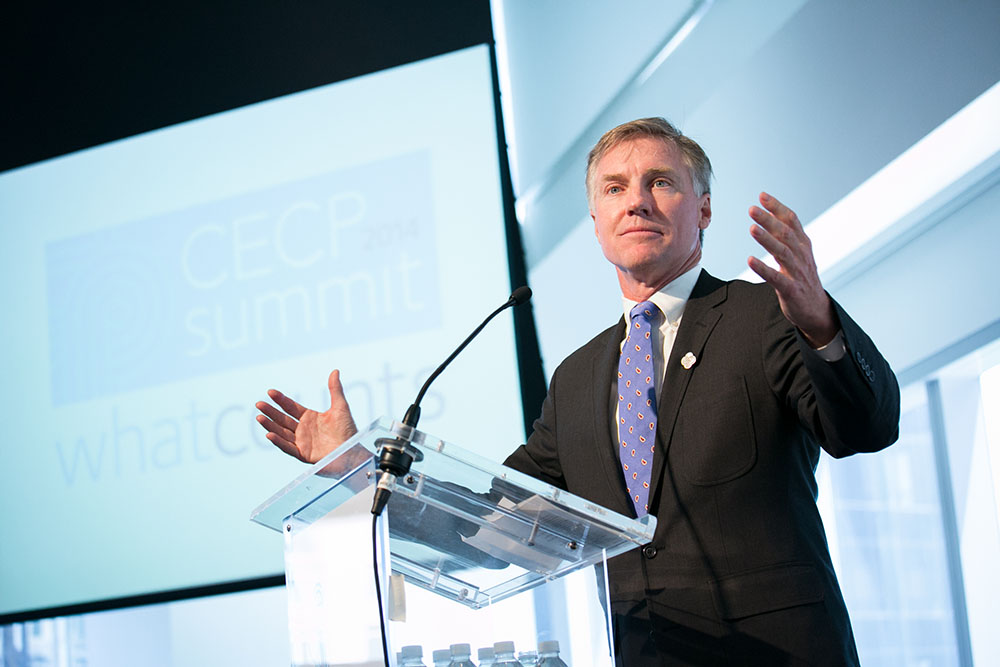As president of CECP, Daryl Brewster is leading a team of more than 200 CEOs who believe that businesses should take a leading role in solving society’s biggest challenges. Recently, NationSwell spoke to Brewster about how adding purpose to a business model can contribute to corporate success.
At CECP, do you match corporations with the right cause, or is that something executives figure out on their own?
We’re cause-gnostic. As a general rule, we believe companies will align their cause areas with their business capabilities, opportunities and risks. (Compare that with a CEO who decides to fund opera because he personally likes it.) For example, Salesforce, one of our [participating] companies, didn’t find a real cause area, but what it has are great skills in customer marketing and management. So we helped it develop a program that provides CRM (customer relationship management) services, essentially for free, to more than 20,000 nonprofits.
One criticism of these programs is that they merely offset harm, without addressing a company’s inherent business model. Is that a legitimate concern?
I’m talking to people from a major oil and gas business. The approach used to be: go in, build your refinery, cut prices so that yours are the lowest and don’t care about the people whose lives are affected. The best practices now are to help those communities. That money came from the land, and that money should go back to those there. To a degree, corporate social responsibility programs can help offset the externalities that a business might create.
At the same time, as a whole, corporations are changing. They’re no longer saying, “My business does this; I’ll take some of the proceeds and give it away here.” [Corporate social responsibility programs] are becoming more integrated to make sure they’re sustainable — not just from an environmental perspective, but from a financial standpoint as well. If you’re creating problems over time, they’re going to come back, whether as lawsuits or regulations. We’re seeing a real increase in the companies who put purpose — something that transcends the goods and services the company produces — in their business model.
[ph]
Did you practice this at Krispy Kreme [Brewster served as its CEO from 2006 to 2008], or is this a new passion of yours?
My thought process has certainly crystalized since being at CECP and seeing a lot more examples. This is not something we were taught in business school back in the day. I grew up with a belief in giving back — that business leaders had a responsibility for treating people in the community well — but the way and how you did that didn’t really matter.
At Krispy Kreme, there was one example that really brought it home to me. They had a program called “fun-raising.” You ordered doughnuts on a Tuesday or Wednesday and picked them up on a Friday to sell at your local high school football game to raise money for band or cheerleading uniforms or athletic equipment. The doughnuts sold for 50 cents: We took a quarter and you kept half the profits. When I got to Krispy Kreme, the company had literally run out of money. One of our accountants figured out we actually had given away more money than we had made the year before. But this had gotten us into rural markets, and it kept our machines operating. In need of money, I met with a bunch of Southern bankers, and the first question I asked was, “How many of you have heard of Krispy Kreme’s fundraising program?” I thought we’d get 10 percent of the hands to raise. When 90 percent of the hands went up, I knew that these bankers would not let Krispy Kreme fail.
What innovations in corporate social responsibility are you most excited about right now? Is the role of corporations fundamentally changing?
Companies are stepping up, more than we’ve ever seen before, on key issues such as wages, inclusion and diversity efforts and the environment. This trend may be especially important with the new administration; business is going to have to stand up. A couple of years ago, our vice president created a less inclusive environment for the LGBT community in Indiana,. Companies said, “No. We’re not going to attract employees.” And he backed up on it. It’s a great example of business playing a leadership role.
To learn more about the NationSwell Council, click here.

 "
"